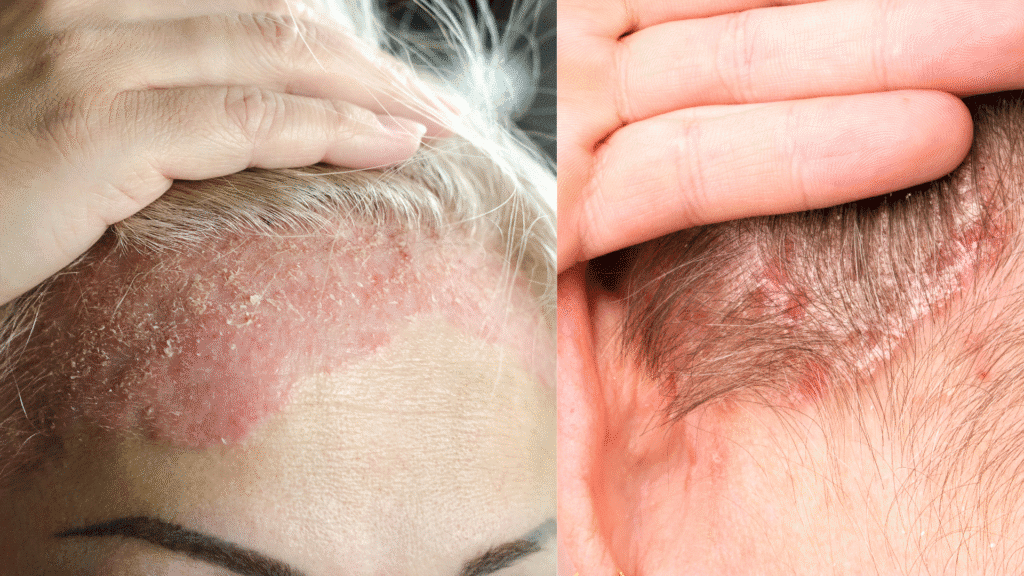
What is Scalp Psoriasis?
Scalp psoriasis is a chronic autoimmune skin condition that leads to thick, scaly patches on the scalp. It occurs when skin cells multiply too quickly, resulting in itchy, inflamed, and flaky areas that may extend beyond the scalp to the forehead, neck, or behind the ears.
Common Symptoms of Scalp Psoriasis
Red patches with thick silvery-white scales
Dry scalp and severe itching
Flaking that resembles dandruff
Burning or soreness on the scalp
Hair loss (temporary), caused by excessive scratching or harsh treatments
Note: Scalp psoriasis is not contagious but can significantly affect quality of life if left untreated.
What Causes Scalp Psoriasis?
The exact cause isn’t fully known, but it’s primarily linked to an overactive immune system. Triggers may include:
Genetics (family history)
Stress or emotional trauma
Hormonal changes
Cold weather or dry climates
Certain medications
Infections or skin injuries
Ayurvedic Perspective on Scalp Psoriasis
In Ayurveda, scalp psoriasis is considered a result of imbalanced doshas (mainly Pitta and Vata), leading to toxin accumulation (Ama) in the body. This manifests as skin inflammation, dryness, and flaking.
Key Ayurvedic Herbs for Scalp Psoriasis
Neem – Purifies blood and reduces inflammation
Bhringraj – Nourishes scalp and reduces dryness
Manjistha – Detoxifies skin and reduces itching
Aloe Vera – Soothes the scalp and promotes healing
Turmeric – Natural anti-inflammatory and antibacterial agent
Effective Ayurvedic Treatments
1. Herbal Oils & Head Massage
Use medicated oils like Neem oil, Bhringraj oil, or Karanja oil to soften scales and calm the skin. Massaging gently improves blood circulation and reduces itchiness.
2. Panchakarma Detox
Ayurveda recommends detox therapies like Virechana (purification) and Shirodhara to eliminate toxins and rebalance doshas.
3. Herbal Supplements
Products like Pacynuron Syrup, rich in brain-soothing and anti-inflammatory herbs, can help manage stress, which is a major trigger for psoriasis flare-ups.
4. Diet & Lifestyle Changes
Avoid spicy, sour, fried foods
Include fresh fruits, vegetables, and whole grains
Drink plenty of water
Practice yoga and meditation for stress management
Scalp Care Tips at Home
Use gentle, sulfate-free shampoos
Avoid scratching the scalp
Apply natural oils regularly
Protect the scalp from sunburn and cold weather
Avoid chemical treatments or harsh hair products
When to See a Dermatologist
If symptoms worsen or don’t improve with home remedies, consult a certified dermatologist or Ayurvedic practitioner. Early treatment prevents scalp damage and improves long-term outcomes.
Final Thoughts
Scalp psoriasis may be chronic, but with the right mix of Ayurvedic care, stress control, and diet, it can be effectively managed. Natural healing takes time—but it heals from the root, not just the surface.
📍Need Help Managing Scalp Psoriasis?
Book your consultation today with Dr. Neha Dongaonkar, MD Dermatology at Skin Heal Solutions, and explore holistic Ayurvedic treatments for lasting relief.

